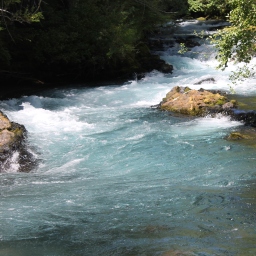Media ethics and the post-Fukushima Oishinbo saga
In the spring of 2014, a Japanese comic author challenged his country’s mainstream media narrative of the situation at Fukushima Prefecture, home to one of the world’s worst-ever nuclear accidents (Kiger, 2013), with accounts of environmental damage and disturbing health consequences for local residents. The ensuing media controversy garnered the wrath of the country’s prime … Continue reading Media ethics and the post-Fukushima Oishinbo saga
Portlandia and the promise of urban sustainability
In his 1975 novel Ecotopia, Ernest Callenbach describes an ecological utopia where the urban metropolis takes on a symbiotic relationship with its surrounding wilderness. Values congruent with the environmental movement help shape a new cityscape. Polluting automobiles are banished in favor of bicycles, food is locally sourced, and architecture promotes urban density instead of suburban … Continue reading Portlandia and the promise of urban sustainability
Drone activism in the environmental sphere
Unmanned aerial vehicles, better known as drones, have enjoyed significant usage for military, security, and engineering purposes in recent years. Equipped with videography equipment such as GoPro cameras, their increasing usage in the environmental arena includes activities such as locating wildlife, tracking natural disasters such as wildfires, and mapping remote geographies. The surveying of forests … Continue reading Drone activism in the environmental sphere
Media Portrayals of Hashtag Activism: The case of #Idlenomore
The following is an excerpt from my article “Media Portrayals of Hashtag Activism: A Framing Analysis of Canada’s #Idlenomore Movement.” For advocates of digital media as a vehicle for more inclusive public discourse around society’s most pressing issues, the growing popularity of social media tools gives reason for hope. While many websites and email campaigns … Continue reading Media Portrayals of Hashtag Activism: The case of #Idlenomore
Ice Road Trucking on the Time and Space Highway
Harold Innis, spatialization, and the political economy of Arctic media Among global geographies today, the role of time and space may be most pronounced in the Arctic. It is where transportation technologies, particularly in the realms of aviation, shipping, and long-haul trucking, assure economic development and the exploitation of environmental resources. It is also where … Continue reading Ice Road Trucking on the Time and Space Highway
On IAMCR Montreal, environmental communication, and the Arctic Council
A few weeks have passed since the annual gathering of International Association for Media and Communication Research (IAMCR), this year held in Montreal, Quebec. IAMCR is pretty remarkable for a few reasons, which I’ll get into momentarily. For disclosure’s purposes, I should mention that I have been volunteering for the organization over the past year … Continue reading On IAMCR Montreal, environmental communication, and the Arctic Council
Patagonia and DamNation: How documentary activism serves as a new form of corporate social responsibility
The following is excerpted from a conference paper I presented at the International Public Relations Research Conference, hosted by the University of Miami, in March of 2015. My study examines the evolution of corporate social responsibility into a form of organizational activism, with Patagonia’s well-regarded DamNation documentary as a case in point. — In March … Continue reading Patagonia and DamNation: How documentary activism serves as a new form of corporate social responsibility
Le Bon’s mob psychology reconsidered: Leveraging crowd capital for social, organizational good
Typhoon Hagupit, the devastating typhoon that hit the Philippines this past December, was notable for its particular ferocity – marked by 27 deaths and over one million residents evacuated. In some coastal areas, over 80 percent of all homes in the typhoon’s path were destroyed. What leaves cause for hope in the aftermath of this … Continue reading Le Bon’s mob psychology reconsidered: Leveraging crowd capital for social, organizational good





